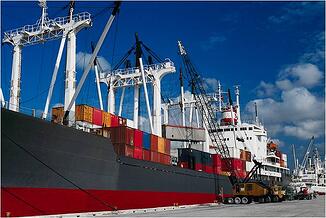or the alternate title:
Why it sucks to be a Chinese (or any –ese) shipping company right now and what can be done about it:
Hellenic News just published an amazingly brief article[1] (Wow! Can I get away with postings that short, boss? No? Hangs head slowly) that simply stated how 80% of Chinese-owned cargo companies are in the red.
This is even worse than the stats this time last year, when a dismal 70% of domestic shipping companies were in the red. That is four out of five, people. FOUR OUT OF FIVE! The forecast for this year is even worse.[2]
 Now this subject is as depressing as–well, I would use a word that rhymes with well or some other four letter word but to avoid offending any readers, I’ll just say it’s really depressing. I couldn’t help wondering why ship owners in the international shipping business are having such problems. As someone who is not completely foreign to therapy, and perhaps could use a lot of it, the bottom line always seems to be becoming aware of the problem is the first step to finding a solution.
Now this subject is as depressing as–well, I would use a word that rhymes with well or some other four letter word but to avoid offending any readers, I’ll just say it’s really depressing. I couldn’t help wondering why ship owners in the international shipping business are having such problems. As someone who is not completely foreign to therapy, and perhaps could use a lot of it, the bottom line always seems to be becoming aware of the problem is the first step to finding a solution.
I started doing some research about WHY the international shipping industry is so hard on ship owners currently. And I found stuff. A LOT OF STUFF. A lot of technical, boring, economical, complicated kinda stuff. And I thought, Man! I wish there was some article that summed it up for the layperson.
Then I thought this is how I can serve humanity and meet my blog quota for the week all in one neat little package! I will be that sucker who digests the tough stuff for you and serves it all nice and pureed for easy digestion just like I do with carrots for my 9-month-old. He has no teeth–he needs it pureed.
Of course, you have teeth, intellectually speaking, and do not need the pureed version. But hey, you are short on time so here goes.
Why it sucks to be a Chinese (or any –ese) shipping company right now
Global shipping is often described as “cyclical” by industry pundits. Cyclical here meaning there are long, slow trends toward an increase in traffic (and thus profit) followed by a lull in demand and a subsequent dip in profits for ship owners. The last nadir in the cycle hit during the 1980s.
(Can I use the word “nadir” in a blog claiming to be the pureed version for the layperson? I could have just said something like low point. No wait, you’re not the layperson, just the person short on time. Nadir it is.)
The nadir was followed by an upswing in the market, especially as China and other developing nations increased their GDP and exceeded their own production rates for raw materials like coal and iron. This led to a massive flow of goods being imported to China to fuel this growth. [3]
But when production leveled off in China, and elsewhere, investors who had purchased and commissioned ships at the height of the market were suddenly losing money. The market was flooded with more ships than were needed to move freight to and fro.
Prices for international import and export plummeted while fuel costs for keeping the vessels steaming along rose dramatically, increasing the cost of operation.[4] The end result was that many shipping companies were operating their vessels at below cost just to try to stay afloat financially.
Then the global economic depression (depression, recession–tomāto, tomăto) hit in 2008-2009, making a bad situation even worse. Many of the ships were purchased or commissioned on credit from a few powerful banks. Shipping industry bank debt used to mean foreclosure for those caught in the downturn end of the cycle.
Recently though, banks have been working with shipping companies to weather the storm of depressed economy as well as refraining from making new loans to would-be ship owners.
What can be done about it
Finally, the pro: It is a moment ripe for wealthy investors to purchase various types of import/export vessels at even or below cost.[5] Those who have already invested in shipping should be patient and do all they can to wait out this most recent economic downturn (If things are cyclical, what goes down must come up).
Why stick with such a volatile investment? Because overall, international shipping is a solid investment. In fact, international shipping is essential. Up to 90% of world trade is shipped overseas via the shipping industry’s global fleet. The world economy needs the maritime import/export industry. And now could be just the time to invest.
Either that or now is the time to get a free freight rate quote for your international shipping. UCM, a thriving freight forwarding company in the international shipping industry with 25+ years of experience, is always ready to help you with that.
